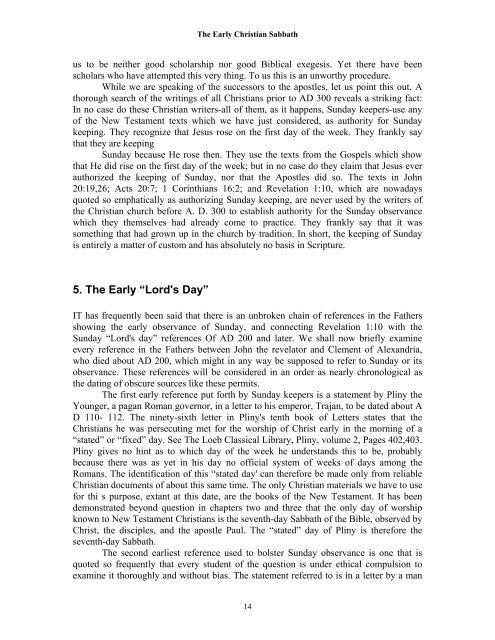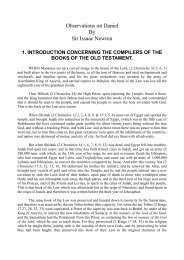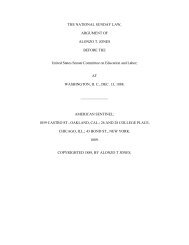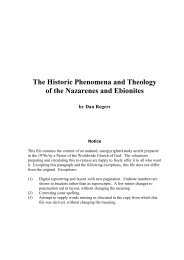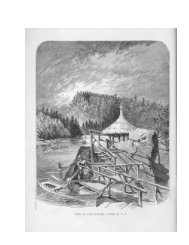THE EARLY CHRISTIAN SABBATH - Friends of the Sabbath Australia
THE EARLY CHRISTIAN SABBATH - Friends of the Sabbath Australia
THE EARLY CHRISTIAN SABBATH - Friends of the Sabbath Australia
You also want an ePaper? Increase the reach of your titles
YUMPU automatically turns print PDFs into web optimized ePapers that Google loves.
The Early Christian <strong>Sabbath</strong><br />
us to be nei<strong>the</strong>r good scholarship nor good Biblical exegesis. Yet <strong>the</strong>re have been<br />
scholars who have attempted this very thing. To us this is an unworthy procedure.<br />
While we are speaking <strong>of</strong> <strong>the</strong> successors to <strong>the</strong> apostles, let us point this out. A<br />
thorough search <strong>of</strong> <strong>the</strong> writings <strong>of</strong> all Christians prior to AD 300 reveals a striking fact:<br />
In no case do <strong>the</strong>se Christian writers-all <strong>of</strong> <strong>the</strong>m, as it happens, Sunday keepers-use any<br />
<strong>of</strong> <strong>the</strong> New Testament texts which we have just considered, as authority for Sunday<br />
keeping. They recognize that Jesus rose on <strong>the</strong> first day <strong>of</strong> <strong>the</strong> week. They frankly say<br />
that <strong>the</strong>y are keeping<br />
Sunday because He rose <strong>the</strong>n. They use <strong>the</strong> texts from <strong>the</strong> Gospels which show<br />
that He did rise on <strong>the</strong> first day <strong>of</strong> <strong>the</strong> week; but in no case do <strong>the</strong>y claim that Jesus ever<br />
authorized <strong>the</strong> keeping <strong>of</strong> Sunday, nor that <strong>the</strong> Apostles did so. The texts in John<br />
20:19,26; Acts 20:7; 1 Corinthians 16:2; and Revelation 1:10, which are nowadays<br />
quoted so emphatically as authorizing Sunday keeping, are never used by <strong>the</strong> writers <strong>of</strong><br />
<strong>the</strong> Christian church before A. D. 300 to establish authority for <strong>the</strong> Sunday observance<br />
which <strong>the</strong>y <strong>the</strong>mselves had already come to practice. They frankly say that it was<br />
something that had grown up in <strong>the</strong> church by tradition. In short, <strong>the</strong> keeping <strong>of</strong> Sunday<br />
is entirely a matter <strong>of</strong> custom and has absolutely no basis in Scripture.<br />
5. The Early “Lord's Day”<br />
IT has frequently been said that <strong>the</strong>re is an unbroken chain <strong>of</strong> references in <strong>the</strong> Fa<strong>the</strong>rs<br />
showing <strong>the</strong> early observance <strong>of</strong> Sunday, and connecting Revelation 1:10 with <strong>the</strong><br />
Sunday “Lord's day” references Of AD 200 and later. We shall now briefly examine<br />
every reference in <strong>the</strong> Fa<strong>the</strong>rs between John <strong>the</strong> revelator and Clement <strong>of</strong> Alexandria,<br />
who died about AD 200, which might in any way be supposed to refer to Sunday or its<br />
observance. These references will be considered in an order as nearly chronological as<br />
<strong>the</strong> dating <strong>of</strong> obscure sources like <strong>the</strong>se permits.<br />
The first early reference put forth by Sunday keepers is a statement by Pliny <strong>the</strong><br />
Younger, a pagan Roman governor, in a letter to his emperor, Trajan, to be dated about A<br />
D 110- 112. The ninety-sixth letter in Pliny's tenth book <strong>of</strong> Letters states that <strong>the</strong><br />
Christians he was persecuting met for <strong>the</strong> worship <strong>of</strong> Christ early in <strong>the</strong> morning <strong>of</strong> a<br />
“stated” or “fixed” day. See The Loeb Classical Library, Pliny, volume 2, Pages 402,403.<br />
Pliny gives no hint as to which day <strong>of</strong> <strong>the</strong> week he understands this to be, probably<br />
because <strong>the</strong>re was as yet in his day no <strong>of</strong>ficial system <strong>of</strong> weeks <strong>of</strong> days among <strong>the</strong><br />
Romans. The identification <strong>of</strong> this “stated day' can <strong>the</strong>refore be made only from reliable<br />
Christian documents <strong>of</strong> about this same time. The only Christian materials we have to use<br />
for thi s purpose, extant at this date, are <strong>the</strong> books <strong>of</strong> <strong>the</strong> New Testament. It has been<br />
demonstrated beyond question in chapters two and three that <strong>the</strong> only day <strong>of</strong> worship<br />
known to New Testament Christians is <strong>the</strong> seventh-day <strong>Sabbath</strong> <strong>of</strong> <strong>the</strong> Bible, observed by<br />
Christ, <strong>the</strong> disciples, and <strong>the</strong> apostle Paul. The “stated” day <strong>of</strong> Pliny is <strong>the</strong>refore <strong>the</strong><br />
seventh-day <strong>Sabbath</strong>.<br />
The second earliest reference used to bolster Sunday observance is one that is<br />
quoted so frequently that every student <strong>of</strong> <strong>the</strong> question is under ethical compulsion to<br />
examine it thoroughly and without bias. The statement referred to is in a letter by a man<br />
14


